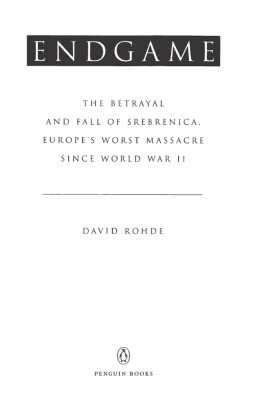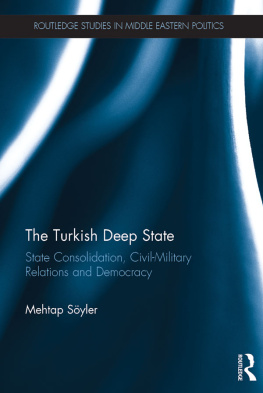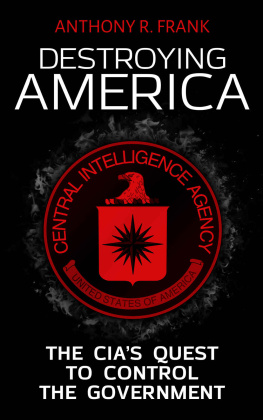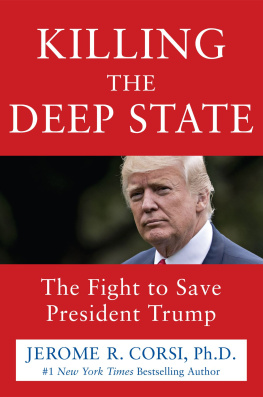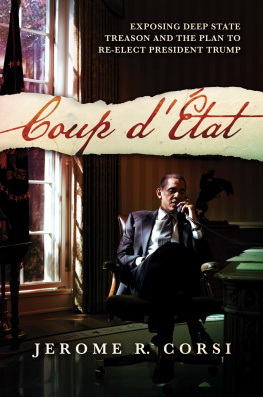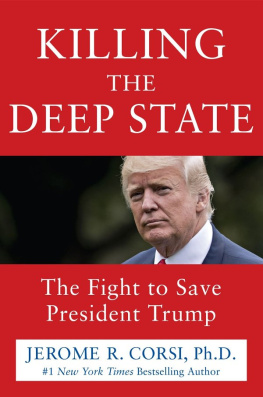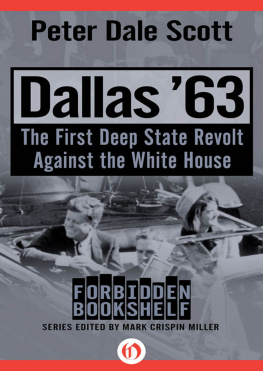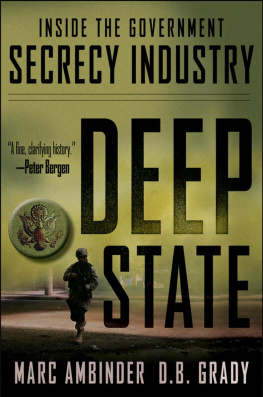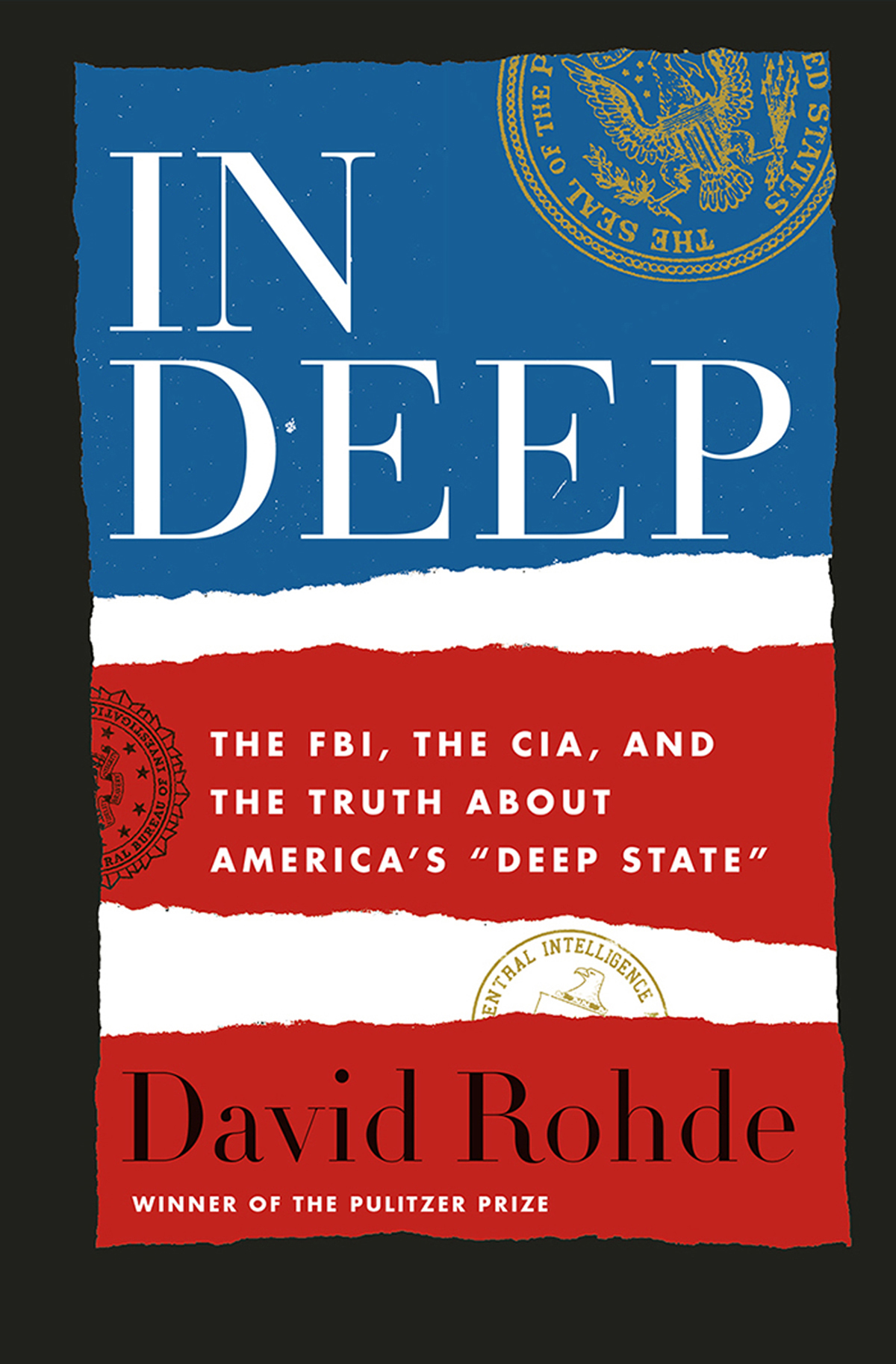Contents
Guide
Page List
IN
DEEP
THE FBI, THE CIA, AND THE TRUTH
ABOUT AMERICAS DEEP STATE

David Rohde

For my daughters Ella and Julia
and my wife Kristen
As an instrument for practical action, law is responsive to the wisdom of its time, which may be wrong, but it carries forward, sometimes in opposition to this wisdom or passion, a memory of received values.
Edward Levi, United States Attorney General, 19751977
CONTENTS
T he government source who leaked the story to me about the first phone call between President Trump and Vladimir Putin seemed genuinely frightened. several weeks after Trump took office in 2017, the piece contained no bombshell disclosures about coordination between the 2016 Trump campaign and Russia. Instead, it exposed politically embarrassing details regarding how the new American president had conducted himself. During the hour-long conversation, Trump had denounced the primary nuclear arms agreement between the United States and Russia as one of many bad deals negotiated by the Obama administration. When Putin raised the possibility of extending the treaty, known as New START, Trump paused and asked his aides what the treaty was, according to my source and an official who had spoken with my colleague Jonathan Landay. When we asked the White House for comment, spokesman Sean Spicer said Trump knew what the New START treaty was but had turned to his aides for an opinion. Throughout the call, Trump also ceaselessly bragged to Putin about his own popularity.
of Trumps first calls with foreign leadersof Mexico and Australiahad already leaked to news outlets and drawn more attention. Officials in the White House were furious about the multiple leaks involving presidential phone calls. They vowed to launch formal criminal investigations and prosecute the perpetrators. To help protect the source, we agreed to cut off contact with each other. In a final conversation, I promised that I would go to prison to protect the sources identity. We both knew that the whistleblower was more likely to be prosecuted than me.
Two and a half years later, in the fall of 2019, a whistleblower complaint filed by a CIA official about a phone call between Trump and another foreign leaderthe president of Ukrainesparked an impeachment inquiry. I wanted to know what my source on the Trump-Putin call thought of the whistleblower and the firestorm then unspooling. We met in a restaurant in the Washington area. The source did not mince words: Career government officials had a duty to report waste, fraud, and misconduct by government officials, including the president. The whistleblower, whose identity Trump was demanding be made public, should be protected and the state of divisiveness in Washington was lamentable: When doing your job as a policy expert means you are physically in danger, not from an international adversary, but from people in your own government, its confounding.
To President Trump, my source, as well as the Ukraine whistleblower, are part of a conspiracy by a group of unelected government officials to force a duly elected president from power. They are members of the deep statean ill-defined term that Trump uses to refer to people ranging from senior FBI and CIA officials to the Pentagon, to career civil servants across the federal government. Those officials, Trump and his allies argue, have mounted a concerted effort to delegitimize his presidency. Trump has vowed to make the deep state a cornerstone of his reelection effort. Democrats say Trump is spreading conspiracy theories for political gain. They defend the civil service, which was created after the Civil War to prevent politicians from turning the federal government into a patronage mill where supporters receive jobs based on political loyalty, not merit.
Every modern American president has expressed distrust of career government officials in Washington. They view themselves, correctly, as carrying a democratic mandate from voters to implement the policy platform that they promised voters. Jimmy Carter feared that members of the CIA would refuse to implement reforms designed to end decades of agency abuses. Ronald Reagan thought liberals in the State Department opposed his effort to confront Communism. George H. W. Bush distrusted independent counsels. Bill Clinton believed the FBI had gone rogue. George W. Bushs administration searched intensively for the intelligence officials who they thought leaked the existence of his post-9/11 . Barack Obama feared that Pentagon officials had tried to box him into deploying large numbers of troops to Afghanistan. But no president had attacked the motives of career government officials as publicly or angrily as Trump. No president has so openly trafficked in conspiracy theories for political gain.
On June 16, 2017, Trump became the first American president to apply the term deep state to the United States government. Trump retweeted to his 60 million followers a post from Fox News host Sean Hannity promoting his program that evening. Hannity began his show with footage of the shooting that week of three people, including Republican House Majority Whip Steve Scalise, at a Republican practice session for Congresss annual charity baseball game in Alexandria, Virginia. A left-wing activist angered by Trumps election had fired 62 rounds from a semiautomatic rifle at the Republicans. It was a miracle that no one, apart from the gunman, had been killed. Gabrielle Giffords, a Democratic congresswoman shot in the head by a mentally ill man in 2011, condemned the . For a moment, there was bipartisan fear that the countrys polarization could spark wide-scale political violence.
Hannity, though, dismissed Democratic condemnations of the shootings as a farce to hide the lefts true intentions. In a twelve-minute monologue, he condemned the investigation of Special Counsel Robert Mueller and warned viewers that the deep state was trying to reverse the result of the 2016 election. This deep state, this fourth branch of government, as were calling it, doesnt care about getting the truth to you, the American people. And of course, the mediatheyre the willing accomplices. Their goal is the exact opposite here, he said. They are selectively leaking information, intelligence information that is meant to damage, in this case, the president of the United States of America. Hannity concluded his monologue with a warning. He said hatred was part of the lefts DNA, and predicted more violent attacks against , Republicans in this country.
Three years into the Trump presidency, deep state has become part of the Trumpian lexicon, along with witch hunt and fake news. President Trump himself increasingly invokes the term. In 2019, Trump used it at least 23 times, . The president and his supporters blame the deep state for leaks, including the one I wrote about for Reuters, that disparage him. They blame it for Trumps impeachment. Mike Rogers, a Republican congressman from Alabama, decried it on the floor of the House during the final impeachment debate: This is a sad day for our nation when one political party, along with their cohorts in the deep state and the mainstream media, try to hijack our Constitution.
This book is an effort to answer the question of whether a deep state exists in America. To conservatives, the deep state is an ever-growing government bureaucracy, an administrative state that they think relentlessly encroaches on the individual rights of Americans and whose highest loyalty is to its own preservation and power. Liberals are less apt to use the term deep state, but they fear the military-industrial complexa cabal of generals and defense contractors who they believe routinely push the country into endless wars, operate a vast surveillance state, and enrich themselves in the process. Voters of all ideologies increasingly disdain the politicians, lobbyists, and journalists who they feel unilaterally set the countrys political agenda and are increasingly out of touch with ordinary Americans.


